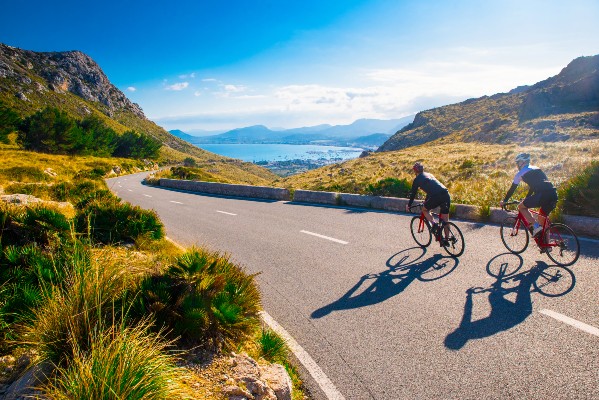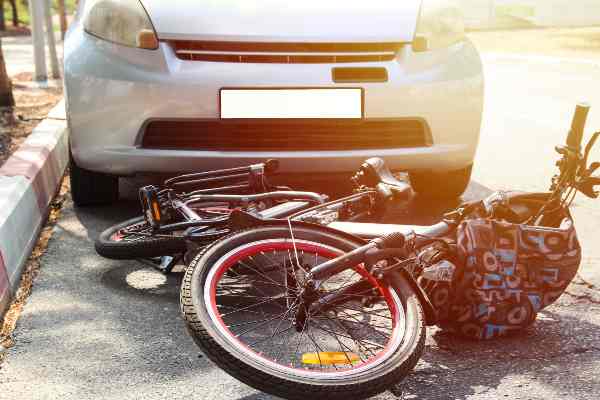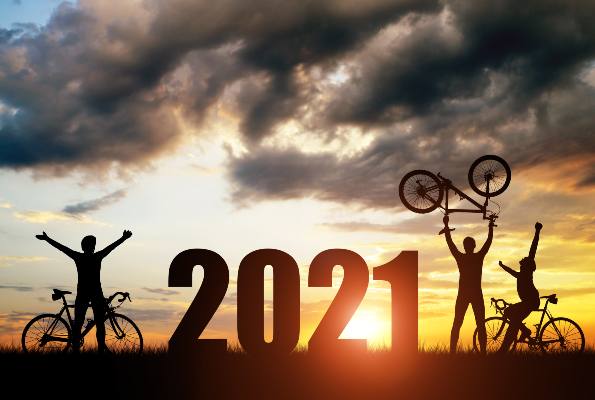Cycling is one of the healthiest and most convenient ways of getting around the city of Orlando. You can avoid heavy traffic at peak hours and get where you need to be on time and while staying fit and protecting the environment. However, there is a dark side to riding a bicycle in Florida. Unfortunately, our state has one of the largest numbers of bicycle accident fatalities in the US.
According to a survey by National Highway Traffic Safety Administration (NHTSA) quoted by the Orlando Weekly, out if 783 bike ride fatalities across the US in 2017, 125 of them (16%) were in Florida. In most of these cases, the fatal accidents were not caused by gross negligence, but mundane, avoidable breaches of traffic laws.
At VG Law, we are committed to helping any bike accident victim seek justice and fair compensation for their injuries and damages. At the same time, we believe that we should strive to warn all bicyclists of the risks they are facing on the roads and teach them how to stay safe while riding along a bike lane in Orlando.

According to the Florida Statutes 316.2065, bicycle riders have the same rights and obligations as any other users of the public roads, including motorized vehicles operators (car drivers, motorcyclists, electric bikes riders). This means, at a basic level, that bicyclists should keep on their assigned traffic lane (if it exists), follow the flow of traffic in the same direction, and comply with the signals given by traffic controls.
More detailed rules on the safe operation of bicycles on public roads stipulate that:
Whether you want to ride to work or explore some of the most scenic bike trails, such as Lake Apopka Loop Trail, Seminole Wekiva Trail, South Lake Trail or the Shingle Creek Trail, safety must be your primary concern. Accidents can happen even to experienced bicyclists. To avoid them, make sure you follow the following safety tips:
Although the helmet is compulsory by law only for bicyclists under 16, everyone should put it on before starting a bicycle ride. Bike helmets save lives - and this is no exaggeration.
So, for your own safety, go beyond the letter of bike laws and make sure that you wear a properly fitting bike helmet at all times. The NHTSA offers a helpful guide to help you select the right helmet, as well as practical advice, such as:
Should you start cycling on the West Orange Trail or in the 4-acre Orlando Veterans' Memorial Park? Or maybe you should try the Howell Branch Road? The choice depends on how well you know the place. You will find a well-developed bike trail network all over Florida, especially in:
For beginners in our city, it is advisable to use the Orlando Urban Trail specially designed for bicyclists (you can find trail maps at most bike rentals or at your go-to bike shop). Being in a known and comfortable environment will allow you to develop your riding skills while paying proper attention to other trail users.
Also, when you are riding your bike in various areas in Florida, such as Lake County, Poll County or Orange County, you are most likely going to have to cross railroad tracks. This means that you have to be aware not only of passenger vehicle traffic but also pay attention to railroad crossings.
If you look at the bike trail map of Florida, you will notice that each trail is marked: beginner, intermediate and advanced trail. With an increased appeal of bike rides, we now see a lot of people attempting an ambitious bike path in areas such as off-road tracks. You should start with road riding on marked bike lanes or on paved bike paths in parks and outside cities.
Also, Florida's parks are great places to hone your cycling skills. Seasoned bicyclists recommend:
At the same time, you can use various online resources, such as the Florida Bicycle Association, the NHTSA, and the National Safety Council to learn defensive riding tips. Moreover, the Bike Safety Month in Florida in March, the perfect period to attend bike riding and safety workshops.
When you choose an adult bike, you believe that they are all the same. This is not true. If you put several bikes side by side on bike racks, you will notice the differences in terms of build and size. Some bike frame models are designed for off-road and mountain bicycle trails. Others are ideal for street trails.
Apart from the type of bike riding you practice, the bicycle should fit you: it must not be either too large or too small. You must be able to maintain perfect control of your bicycle, either on a paved trail or on a bumpy trail.
Unfortunately, the second cause of bicycle fatalities across the US in 2019 was low visibility to other road users. 102 bicyclists killed in motor vehicle accidents were either not using a bike light or not wearing visible clothing (brightly colored and with reflective elements).
Equipping your bike with a rear light is a must, especially if you are planning to take a long bicycle ride in scenic areas such as the 75-mile-long Pinellas Trail Loop or the 28-mile Cross Seminole Trail. Chances are you may be still cycling when it gets dark.
Also, you may get lost, especially during a first-time exploration of the 40-acre Sanlando Park, especially if you do not carry a map of the bike trail network. In this case, being visible is essential if you want to be found and rescued quickly.
Accidents can happen on a lonely 15-foot wide trail and on a busy bike lane in the city. When it happens, you must always call 9-1-1 and ask for an ambulance. Your injuries may not look serious, but head injury or internal organ damage can start showing symptoms hours or days later.
Make sure you give the rescue team all the details about your position (for instance, 3 miles into the Dunnellon Trail or close to the exit of the Lake Apopka Loop Trail). As you wait for the ambulance, take photos and videos of the accident scene to use as evidence at a later date.
As soon as possible, hire an experienced personal injury lawyer at VG Law to evaluate your case and help you win your fair compensation. We serve all Central Florida and other areas and use the most innovative and effective techniques to win your case.
Injured on a bike on Cady Way Trail or on the Sandford Riverwalk Trail by someone's negligence while driving a passenger car? Call us now and know your rights: 833-HELP-365!
Meta description: Find out how to stay safe on paved bike paths or off-road trail and what you have to do in order to get fair compensation for your injuries and economic losses after an accident.
Cycling is one of the healthiest and most convenient ways of getting around the city of Orlando. You can avoid heavy traffic at peak hours and get where you need to be on time and while staying fit and protecting the environment. However, there is a dark side to riding a bicycle in Florida. Unfortunately, our state has one of the largest numbers of bicycle accident fatalities in the US.

According to a survey by the National Highway Traffic Safety Administration (NHTSA) quoted by the Orlando Weekly, out if 783 bike ride fatalities across the US in 2017, 125 of them (16%) were in Florida. In most of these cases, the fatal accidents were not caused by gross negligence, but mundane, avoidable breaches of traffic laws.
At VG Law, we are committed to helping any bike accident victim seek justice and fair compensation for their injuries and damages. At the same time, we believe that we should strive to warn all bicyclists of the risks they are facing on the roads and teach them how to stay safe while riding along a bike lane in Orlando.
According to the Florida Statutes 316.2065, bicycle riders have the same rights and obligations as any other users of the public roads, including motorized vehicles operators (car drivers, motorcyclists, electric bikes riders). This means, at a basic level, that bicyclists should keep on their assigned traffic lane (if it exists), follow the flow of traffic in the same direction and comply with the signals given by traffic controls.
More detailed rules on the safe operation of bicycles on public roads stipulate that:
Whether you want to ride to work or explore some of the most scenic bike trails, such as Lake Apopka Loop Trail, Seminole Wekiva Trail, South Lake Trail, or the Shingle Creek Trail, safety must be your primary concern. Accidents can happen even to experienced bicyclists. To avoid them, make sure you follow the following safety tips:
Although the helmet is compulsory by law only for bicyclists under 16, everyone should put it on before starting a bicycle ride. Bike helmets save lives - and this is no exaggeration.
So, for your own safety, go beyond the letter of bike laws and make sure that you wear a properly fitting bike helmet at all times. The NHTSA offers a helpful guide to help you select the right helmet, as well as practical advice, such as:
Should you start cycling on the West Orange Trail or in the 4-acre Orlando Veterans' Memorial Park? Or maybe you should try the Howell Branch Road? The choice depends on how well you know the place. You will find a well-developed bike trail network all over Florida, especially in:
For beginners in our city, it is advisable to use the Orlando Urban Trail specially designed for bicyclists (you can find trail maps at most bike rentals or at your go-to bike shop). Being in a known and comfortable environment will allow you to develop your riding skills while paying proper attention to other trail users.
Also, when you are riding your bike in various areas in Florida, such as Lake County, Poll County, or Orange County, you are most likely going to have to cross railroad tracks. This means that you have to be aware not only of passenger vehicle traffic, but also pay attention at railroad crossings.
If you look at the bike trail map of Florida, you will notice that each trail is marked: beginner, intermediate and advanced trail. With an increased appeal of bike rides, we now see a lot of people attempting an ambitious bike path in areas such as off-road tracks. You should start with road riding on marked bike lanes or on paved bike paths in parks and outside cities.
Also, Florida's parks are great places to hone your cycling skills. Seasoned bicyclists recommend:
At the same time, you can use various online resources, such as the Florida Bicycle Association, the NHTSA, and the National Safety Council to learn defensive riding tips. Moreover, the Bike Safety Month in Florida in March, the perfect period to attend bike riding and safety workshops.
When you choose an adult bike, you believe that they are all the same. This is not true. If you put several bikes side by side on bike racks, you will notice the differences in terms of build and size. Some bike frame models are designed for off-road and mountain bicycle trails. Others are ideal for street trails.
Apart from the type of bike riding you practice, the bicycle should fit you: it must not be either too large or too small. You must be able to maintain perfect control of your bicycle, either on a paved trail or on a bumpy trail.
Unfortunately, the second cause of bicycle fatalities across the US in 2019 was low visibility to other road users. 102 bicyclists killed in motor vehicle accidents were either not using a bike light or not wearing visible clothing (brightly colored and with reflective elements).
Equipping your bike with a rear light is a must, especially if you are planning to take a long bicycle ride in scenic areas such as the 75-mile-long Pinellas Trail Loop or the 28-mile Cross Seminole Trail. Chances are you may be still cycling when it gets dark.
Also, you may get lost, especially during a first-time exploration of the 40-acre Sanlando Park, especially if you do not carry a map of the bike trail network. In this case, being visible is essential if you want to be found and rescued quickly.

Accidents can happen on a lonely 15-foot wide trail and on a busy bike lane in the city. When it happens, you must always call 9-1-1 and ask for an ambulance. Your injuries may not look serious, but head injury or internal organ damage can start showing symptoms hours or days later.
Make sure you give the rescue team all the details about your position (for instance, 3 miles into the Dunnellon Trail or close to the exit of the Lake Apoopka Loop Trail). As you wait for the ambulance, take photos and videos of the accident scene to use as evidence at a later date.
As soon as possible, hire an experienced personal injury lawyer at VG Law to evaluate your case and help you win your fair compensation. We serve all Central Florida and other areas and use the most innovative and effective techniques to win your case.
Injured on a bike on Cady Way Trail or on the Sandford Riverwalk Trail by someone's negligence while driving a passenger car? Call us now and know your rights: 833-HELP-365!
Meta description: Find out how to stay safe on paved bike paths or off-road trails and what you have to do in order to get a fair compensation for your injuries and economic losses after an accident.